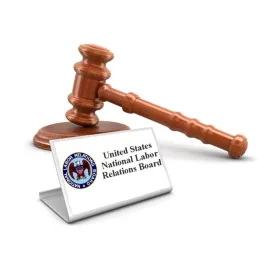INTRODUCTION
On 21 February 2023, a divided National Labor Relations Board (NLRB or Board) held in McLaren Macomb1 that employers violate the National Labor Relations Act (NLRA or Act) when they present employees with severance agreements containing confidentiality and non-disparagement provisions that could be construed to broadly waive employees’ rights under the NLRA.
In doing so, the NLRB overturned a Trump-era precedent that previously held severance agreements only violated Section 8(a)(1) of the NLRA when accompanied by other employer violations of the Act, such as an employer’s direct dealing with employees during collective bargaining with their union. As discussed further below, employers, with both unionized and nonunionized workforces, should review employee severance agreements containing confidentiality and non-disparagement provisions for compliance with the McLaren Macomb ruling.
POST-MCLAREN MACOMB, EMPLOYEE SEVERANCE AGREEMENTS WITH CONFIDENTIALITY AND NON-DISPARAGEMENT PROVISIONS MUST BE NARROWLY TAILORED TO RESPECT SECTION 7 RIGHTS
In Baylor,2 the Trump-era Board held that confidentiality, non-disparagement, and no-participation clauses in voluntary severance and waiver agreements were legal under the NLRA under certain conditions. Specifically, Baylor held that they were legal when there was no evidence that the employees offered the agreements were unlawfully discharged under the Act or that circumstances surrounding the offers would tend to infringe on the employees’ Section 7 rights or evidence employer animus against Section 7 activity.
The McLaren Macomb Board heavily criticized Baylor. Employers, it said, were given “carte blanche to offer employees severance agreement[s] that include unlawful provisions” that tended to “interfere with, restrain, or coerce the exercise of employee rights under Section 7.” 3 Baylor, per the McLaren Macomb Board, wrongly focused on the “circumstances under which the agreement was presented to employees,” rather than the severance agreement itself.4
Relying on “pre-Baylor precedent” that held “employees may not broadly waive their rights under the NLRA,”5 McLaren Macomb now holds that employers violate Section 8(a)(1) if they offer agreements that “restrict employees from engaging in activity protected by the [NLRA], or from filing unfair labor practice charges with the Board, assisting other employees in doing so, or assisting the Board’s investigative process.”6 In the Board’s view, severance agreement provisions containing quid pro quos—where employees must forfeit their Section 7 rights in exchange for severance benefits—are inherently coercive and potentially unlawful.7
Moreover, McLaren Macomb held that those “Section 7 rights are not limited to discussions with coworkers, as they do not depend on the existence of an employment relationship between the employee and the employer, and the Board has repeatedly affirmed that such rights extend to former employees.”8 For example, McLaren Macomb held that employers may not seek to use severance agreements to prevent employees from speaking with the media, government officials, or other third parties about labor disputes.9
In a direct repudiation of the Baylor Board’s emphasis on the voluntary nature of the proffered severance agreements, McLaren Macomb explained that whether an employee “accepts the agreement is immaterial” because, “[i]nherent in any proffered severance agreement requiring workers not to engage in protected concerted activity is the coercive potential of the overly broad surrender of NLRA rights if they wish to receive the benefits of the agreement.”10
The NLRB’s proffered policy rationale for its highly protective standard in McLaren Macomb is to enable it to fully investigate alleged NLRA violations from employers by, among other things, speaking with current and former employees about workplace conditions. Under Baylor, the NLRB now argues, those employees may have declined to share information with the Board’s investigative staff because of the chilling effect that broadly drafted severance agreements may have.
EMPLOYER CONSIDERATIONS WHEN DRAFTING SEVERANCE AGREEMENTS POST-MCLAREN MACOMB
McLaren Macomb, while broadly criticizing non-disparagement, confidentiality, and no-participation clauses in severance agreements, largely leaves employers adrift as to the specifics of what a legally enforceable severance agreement may look like. But generally, McLaren Macomb is an invitation to employers and their counsel to review the contractual language used in severance agreements, with special scrutiny paid to potentially problematic confidentiality and non-disparagement provisions.
Specifically, severance agreement drafters should avoid creating the impression that an employer’s enforcement of a provision would create a reasonable tendency to interfere with, restrain, or coerce the exercise of an employee’s Section 7 rights.
One approach is to ensure that any severance agreement provisions, the breach of which may forfeit severance benefits, should be “narrowly tailored to respect the range of those [Section 7] rights.”11
In doing so, employers should keep in mind that the NLRA only covers employees, and excluded from the definition of employees are supervisors, independent contractors, agricultural laborers, and in-home domestic servants, among others. These excluded workers are not subject to the McLaren Macomb rule. However, for the employees that are covered by the Act, nothing in the Board’s decision limits its application to union employees (even though the case specifically involved bargaining unit workers), so its reach likely extends to non-union employers.
Regarding non-disparagement clauses, because McLaren Macomb held that the non-disparagement provision there was so “broad” as to include “statements to [the] Employer’s employees or to the general public which could disparage or harm the image of [the] Employer,” employers may wish to narrow the scope of their own provisions.12
Employers may also want to consider including in severance agreements a disclaimer of restrictions on employees’ rights under the NLRA, including Section 7 rights.
Alternatively, employers may consider strategically limiting the scope of non-disparagement clauses by incorporating the Jefferson Standard13 test, which the Board seemingly approved in McLaren Macomb. In applying the Jefferson Standard test to severance agreements, employees may only be barred from making communications that are disloyal, reckless, or maliciously untrue after termination of the employment relationship.
Another possible recourse for employers would be to limit a non-disparagement clause to only those communications that an employee makes about their former direct employer. Doing so would potentially avoid the “chilling tendency” that employees may feel from not knowing whether they may speak about their former employer’s “parents and affiliated entities and their officers, directors, employees, agents, and representatives.”14
In addition, employers may want to include a reasonable temporal limitation on non-disparagement provisions because the NLRB in McLaren Macomb found that the provision at issue there violated Section 8(a)(1) in part because it applied “[a]t all times hereafter.”15
The same precautions apply to confidentiality provisions, and employers may also wish to consider narrowing the scope of disclosure limitations that an employee is subject to. This is because the NLRB in McLaren Macomb found the confidentiality provision there violated Section 8(a)(1) in part because it applied to “any third person.”16 The Board noted that a reasonable employee could have perceived that broad provision to include NLRB investigators, media outlets, former coworkers, and labor unions.
Ultimately, employers should ensure that any severance agreement they seek to enter into with employees avoids the “end result” of a “sweepingly broad bar that has a clear chilling tendency on the exercise of Section 7 rights of the subject employee."17
WHAT MCLAREN MACOMB MAY MEAN FOR FUTURE NLRB DEVELOPMENTS
McLaren Macomb marks the latest victory in NLRB General Counsel Jennifer Abruzzo’s commitment to overturn Trump-era precedent that her office views as “doctrinal shifts” in federal labor law that upset “an appropriate balance between the rights of workers and the obligations of unions and employers.”18 Indeed, the Trump-era Baylor decision—which McLaren Macomb overturned—was explicitly referenced in a Mandatory Submissions to Advice Memorandum issued by Abruzzo in August 2021, less than one month after her Senate confirmation.19
As a result, employers and their counsel should revisit Abruzzo’s policy memo20 for other Trump-era21 law—and even long-standing NLRB precedent22 —that the current Board may seek to upend to more strongly favor employees under the NLRA.
FOOTNOTES
1 See 372 NLRB No. 58 (Feb. 21, 2023).
2 Baylor Univ. Med. Ctr., 369 NLRB No. 43 (Mar. 16, 2020).
3 McLaren Macomb, 372 NLRB No. 58 (Feb. 21, 2023).
4 Id.
5 Id.
6 Id.
7 Id. (“[T]he coercion in an unlawful severance agreement is inherent in the agreement itself, which purports to condition benefits on the legal forfeiture of Sec. 7 rights.”).
8 Id. (emphasis added).
9 Id.
10 Id. (citing Clark Distrib. Sys., 336 NLRB 747 (2001)).
11 Id.
12 Id.
13 NLRB v. Elec. Workers Loc. 1229 (Jefferson Standard Broad. Co.), 346 U.S. 464, 477 (1953).
14 McLaren Macomb, 372 NLRB No. 58 (Feb. 21, 2023).
15 Id.
16 Id. (emphasis supplied).
17 Id.
18 National Labor Relations Board Memorandum GC 21-04 (Aug. 12, 2021); see also Lauren Gurley, The lawyer who could deliver on Biden’s wish to be the most pro-union president, The Washington Post (Oct. 17, 2022) https://www.washingtonpost.com/business/2022/10/15/jennifer-abruzzo-union-biden-nlrb/.
19 National Labor Relations Board Memorandum GC 21-04 (Aug. 12, 2021).
20 Id.
21 See, e.g., Boeing Co., 365 NLRB No. 154 (2017); LA Specialty Produce Co., 368 NLRB No. 93 (2019).
22 See Ian Kullgren, Revisit Card Check to Ease Union Organizing: NLRB Top Lawyer (1), Bloomberg Law (April 12, 2022) https://news.bloomberglaw.com/daily-labor-report/top-labor-board-attorney-takes-aim-at-union-election-process; Michael Pavlick, What Happens if NLRB Cuts Captive Audience Meetings, Bloomberg Law (Oct. 4, 2022) https://www.bloomberglaw.com/bloomberglawnews/us-law-week/XB3H92A4000000?bna_news_filter=us-law-week#jcite; see also Joy Silk Mills, Inc., 85 NLRB 1263 (1949); Ex-Cell-O Corp., 185 NLRB 107 (1970).




 />i
/>i

